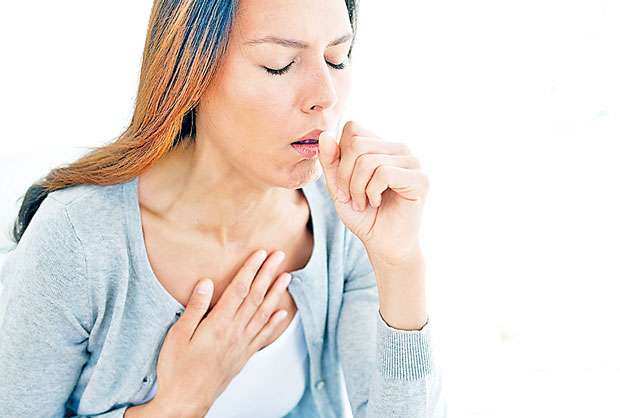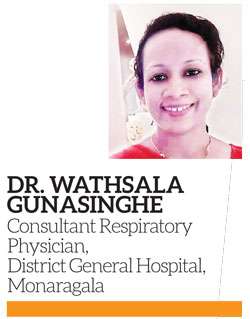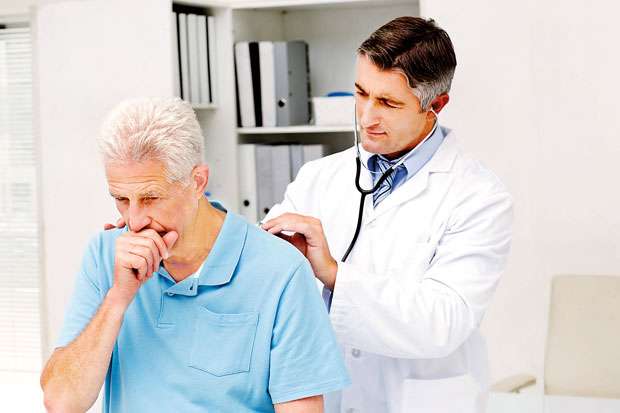Reply To:
Name - Reply Comment

 How many times during your childhood have you heard the phrase, ‘child, don’t get wet, you’ll end up with pneumonia!”. Pneumonia is one of the diseases that all of us fear and this concern is justifiable considering the significant morbidity and mortality associated with it.
How many times during your childhood have you heard the phrase, ‘child, don’t get wet, you’ll end up with pneumonia!”. Pneumonia is one of the diseases that all of us fear and this concern is justifiable considering the significant morbidity and mortality associated with it.
Pneumonia, the symptoms of which first described by Hippocrates nearly 2500 years ago, has been prevalent throughout the sands of time, ailing mankind up until now. Not only does pneumonia pose a serious threat to the patient’s health, it is also a massive burden to the society, mainly due to the high cost of treatment. Therefore, a sound understanding of the process of this disease is helpful in our daily lives.
In this edition of Health capsule, we have consulted Dr. Wathsala Gunasinghe, Consultant Respiratory Physician, District General Hospital, Monaragala, who will be answering some of the more frequently asked questions relating to Pneumonia.
What is pneumonia?
Pneumonia can be described as an infection of the deep lung tissue. The small air-filled sacs (alveoli) of the linings are predominantly affected in this condition and these air sacs get swollen (inflamed) and can get filled with fluid.
How does Pneumonia usually present?
Pneumonia can affect one or both lungs and commonly give rise to symptoms like cough, fever, chills, breathlessness and chest pain that worsen with breathing.
What are the common causes of pneumonia?
Many germs, such as bacteria, viruses and fungi can cause pneumonia. It can also occur following viral flu. In addition, pneumonia can be caused due to more than 30 different causes. Because pneumonia treatment depends on its cause, understanding the cause of pneumonia is important.
Pneumonia is classified according to the types of causative germs and where you got the infection from. Bacteria like Streptococcus pneumonia, Mycoplasma and viruses like influenza and respiratory syncytial virus are common causes of pneumonia.
The most common germs affecting children are different to that of adults and the elderly. People with poor immunity tend to be affected by uncommon germs.
Those having a greater risk of developing pneumonia
Although anyone can develop pneumonia, certain groups of people tend to be more vulnerable.
These groups include babies and young children, people over 65 years of age, people with cancer; especially those who are receiving chemotherapy, people who smoke or drink alcohol to excess, people on drugs who suppress the immune system, and those with HIV are at more risk of developing pneumonia and related adverse events.
In addition to these groups, patients who are in or were recently admitted in hospital can develop pneumonia due to germs acquired during the hospital stay, which is called ‘Hospital Acquired Pneumonia’.
Is pneumonia contagious?
Majority of pneumonia can spread from one person to another. Both viral and bacterial pneumonia can spread to others through inhalation of airborne droplets from a sneeze or a cough. But fungal pneumonia doesn’t spread from person to person.
What are the complications of pneumonia?
In some patients pneumonia can cause complications. Bacteria spreading to the blood stream from a lung infection (bacteraemia), failure to maintain blood oxygen level due to extensive tissue involvement (Respiratory failure) are serious complications of pneumonia. Patients with these complications will need care in Intensive Care Units.
In addition lung cavities with pus (lung abscess) and fluid accumulation of pleural cavity (Pleural Effusion) can also occur as complications of pneumonia. Sometimes these fluid collections need draining with insertion of a chest tube.
Very rarely, despite medical therapy, pneumonia can lead to death; especially in people with weakened immune systems, extremes of age or chronic diseases.

Diagnosis and treatment
Pneumonia is diagnosed based on the patient’s complaints, examination findings, Chest X-ray findings and blood investigation results. Sometimes, testing of sputum is also one.
Pneumonia can be serious so it’s important to receive treatment quickly. The main treatment for bacterial pneumonia is antibiotics. Severe viral pneumonias are treated with antiviral therapy where available. Pneumonia due to fungal infections which are rare in previously healthy individuals, are treated with antibiotics. In addition, controlling the temperature, maintaining adequate hydration and treating any chest pain are also necessary.
When the Pneumonia is mild, the patient can be managed with oral antibiotics and can remain at home. Antibiotics are usually given for a duration of 5 days.
When the pneumonia is severe, when the patient is very ill or when the patient belongs to a high risk category, hospital admission is recommended. Afterwards the patient is treated with antibiotic injections. Combinations of antibiotics are used in these cases. These patients might need oxygen therapy, Nebulization, intensive care support and monitoring.
Patients who develop pneumonia while in hospital or who are on immunosuppressive medications are treated with potent intravenous medications.
Completing the course of antibiotics prescribed by the doctor is necessary to prevent complications.
Duration of recovery
Recovery time varies a lot from person to person and depends on a person’s general health, age and how severe the pneumonia is.
It is important to realize although the cough and fever might subside early, feeling of ill health and fatigue can last up to 3-6 months.
Plenty of rest is advised in the initial period with gradual recommencement of daily activities.
Can we prevent pneumonia from occurring?
Vaccination and good health habits can be helpful in reducing the risk of Pneumonia. Pneumococcal vaccine and yearly influenza vaccine are recommended for patient categories with risk of pneumonia. In addition, good hygienic practices can help minimise the spread of responsible germs. Covering your coughs and sneezes, disposing of used tissue properly and regular hand washing are helpful.
Smoking can increase the susceptibility to respiratory infections and therefore quitting smoking is advised.
A healthy lifestyle with regular exercises, a well balanced diet and adequate rest will also reduce the risk of respiratory infections.
In summary, Pneumonia is a potentially serious infection of the lungs, but can be cured with timely diagnosis and medical care in majority of cases. You can reduce the risk of pneumonia through the cessation of smoking maintaining good hygiene by taking adequate nutrition.